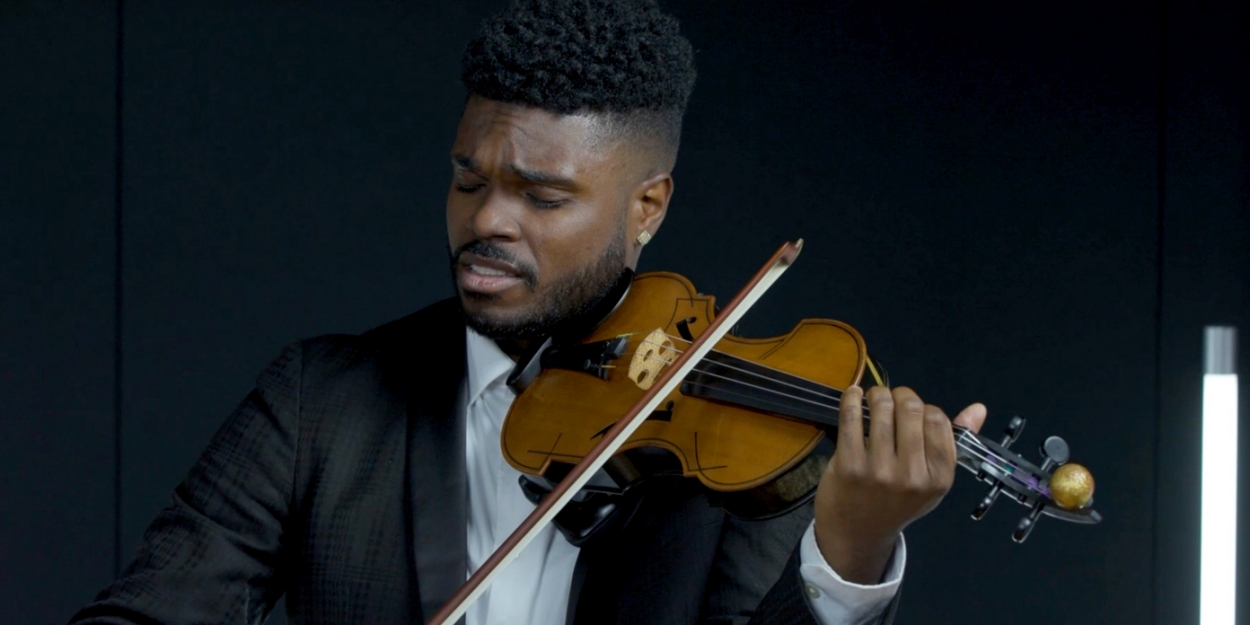Video: Edward W. Hardy Performs 'Evolution: Inspired By The Evolution Of Black Music'
This recording of Evolution, by Irvin Coffee (Videographer) and Martin Skavish (Audio Engineer), took place on January 30, 2024.

Check out this brand new performance video from critically acclaimed composer-violinist and soon-to-be recipient of a Doctor of Arts degree, Edward W. Hardy!
Plus, take an inside look into his upcoming dissertation, "A Compendium of Three Musical Works Inspired by the African American Experience: Recordings, Commentary, and Pedagogical Observations."
"Evolution for solo violin, written in 2016, was premiered at the Howard Theatre for the Congressional Black Caucus on September 16, 2016. This concert, sponsored by Google, was among the inaugural events associated with the opening of the Smithsonian National Museum of African American History and Culture. I created Evolution as a challenging work for my personal growth as a violinist and to push the boundaries of my classical training. My goal was to bridge the gaps between various musical genres, using untraditional notation and techniques such as Richard Greene’s “chopping technique.” I was exploring how to take a minor third, E and G, and expand it through an entire solo violin composition that begins and ends with a spiritual. I was mostly inspired by Wade in the Water because of its history of secret codes embedded in the song that guided slaves as they embarked on their journey to freedom on the Underground Railroad. Through its reflection of classical, jazz, blues, and hip-hop music, Evolution uses fragments of Wade in the Water as a tribute to those who gave us freedom.
Later in 2016, I released my first album, The Woodsman (Original Off-Broadway Solo Recording), which included Evolution as a preview “bonus track.” In 2019, Evolution was digitally released along with its sheet music during artist Javon Conaway's “ARTIVISM831,” an art exhibition in Harlem, New York City. During the 2020 COVID-19 pandemic and in solidarity with the Black Lives Matter movement, distinguished violinists such as Penny Thompson Kruse (Professor of Violin at Bowling Green State University), Benjamin Scott (violinist of the National Symphony Orchestra), and Peter Sulski (faculty in violin and viola at Clark University), performed Evolution in their virtual artist concert series. (Chapter I, pp.3-4)
During the cast warmup, A. Dean Irby encouraged everyone to feel connected to the ground, remembering our ancestors, family, and role models. Irby’s advice became transformative when he said to me, “Leave it all on that stage. Imagine you are singing it. Imagine it’s the song Harold Loomis is searching for.” Suddenly, I understood how to perform this music. It wasn’t just about feeling the distance between two intervals, tempo, ornamentation, or projecting volume; it was about having something to say with every note. When I perform Evolution, I engage in reflection on personal influences such as Irby, Loomis, Hillocks, A Brooklyn Boy, my family, role models, ancestors, and life experiences that have brought me to this moment. Amid revisiting these memories, nothing captures my focus more than contemplating the notion that, had I been born in the early 19th century, my life might have paralleled that of the violinist Solomon Northup.[1] Embracing this mindset allows me to connect authentically with each musical genre.
[1] Solomon Northup (c.1807 - c.1863) was a free African American farmer, labourer, and violinist who was drugged and kidnapped while on tour and sold into slavery. In 1853, Northup published his memoir “Twelve Years a Slave: Narrative of Solomon Northup, a Citizen of New York, Kidnapped in Washington City in 1841, and Rescued in 1853, from a Cotton Plantation near the Red River in Louisiana.” (Chapter II, p.26)
This recording of Evolution, by Irvin Coffee (Videographer) and Martin Skavish (Audio Engineer), took place on January 30, 2024, at the Colorado Public Radio Classical Performance Studio.
Comments
Videos

